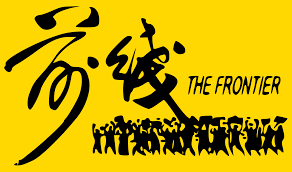
The Frontier was a pro-democracy political group in Hong Kong. It was founded on 26 August 1996 by a group of Legislative Council members and democratic activists headed by Convenor Emily Lau. It was merged into the Democratic Party, the pro-democracy flagship party on 23 November 2008. A new party bearing the same name was established in 2010 by former members who opposed the previous Frontier joining the Democratic Party.

The Democratic Party (DP) is a centre-left liberal political party in Hong Kong. Chaired by Lo Kin-hei, it is the flagship party in the pro-democracy camp and currently has 7 elected representatives in the District Councils.

The United Democrats of Hong Kong was the first political party in Hong Kong. Founded in 1990, the short-lived party was the united front of the liberal democracy forces in preparation of the 1991 first ever direct election for the Legislative Council of Hong Kong. The party won a landslide victory by sweeping 12 of the 18 directly elected seats in the election which shook the political landscape of Hong Kong. In 1994 it was merged with another pro-democracy party Meeting Point to form the contemporary Democratic Party.
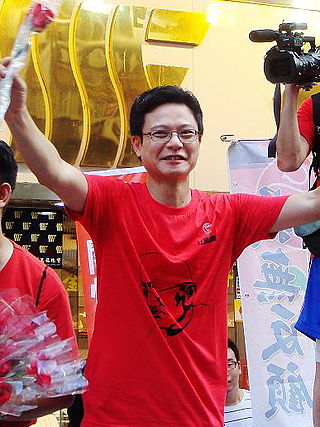
Andrew To Kwan-hang is a Hong Kong politician and activist. He is the former chairman of the League of Social Democrats and former member of the Wong Tai Sin District Council.

The 2000 Hong Kong Legislative Council election was held on 10 September 2000 for members of the 2nd Legislative Council (LegCo) of the Hong Kong Special Administrative Region (HKSAR). The election returned 24 members from directly elected geographical constituencies, 6 seats from the Election Committee constituency and 30 members from functional constituencies, of which 9 uncontested.

Meeting Point was a liberal political organisation and party in Hong Kong formed by a group of former student activists in the 1970s and intellectuals for the discussion for the Sino-British negotiation on the question of Hong Kong prospect in 1983. It was one of the earliest groups in Hong Kong that favoured Chinese sovereignty over Hong Kong but wanted a free, democratic and autonomous Hong Kong.

The Labour Party is a centre-left social democratic political party in Hong Kong established in 2011.
The Democratic Party leadership election was held on 16 December 2012 for the 30-member 10th Central Committee of the Democratic Party in Hong Kong, including chairman and two vice-chairman posts. The incumbent acting Chairwomen Emily Lau defeated Vice-Chairman Sin Chung-kai by a narrow margin, becoming the first Chairwoman of the party. 300 party members voted in the election.

The Third Legislative Council of Hong Kong was the meeting of the legislative branch of the Hong Kong Special Administrative Region Government. The membership of the LegCo is based on the 2004 election. The term of the session was from 1 October 2004 to 30 September 2008, during the second half of the Tung Chee-hwa's administration until his resignation in 2005 and was replaced by Donald Tsang for the rest of the term, and also the beginning of the third term of Chief Executive after Tsang won in the 2007 Election. The Democratic Alliance for the Betterment of Hong Kong (DAB) became the largest party with 10 seats. Notable newcomers to the Legislative Council included Leung Kwok-hung, Alan Leong, Ronny Tong, Albert Cheng, and Jeffrey Lam.
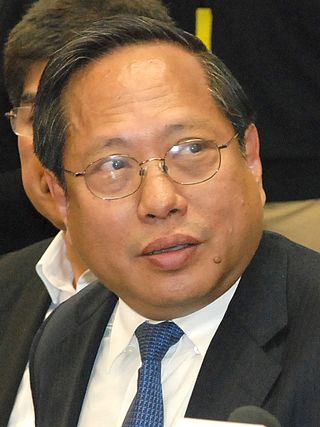
The Democratic Party leadership election was held on 19 December 2010 for the 30-member 9th Central Committee of the Democratic Party in Hong Kong, including chairman and two vice-chairman posts. The incumbent Chairman Albert Ho, Vice-Chairmen Emily Lau and Sin Chung-kai were all re-elected uncontestedly.

The Democratic Party leadership election was held on 17 December 2006 for the 30-member 7th Central Committee of the Democratic Party in Hong Kong, including chairman and two vice-chairman posts. Legislative Council member and party's Vice-Chairman Albert Ho from the mainstreamer faction defeated the incumbent Vice-Chairman Chan King-ming from the Young Turks faction with a large margin, succeeding Lee Wing-tat as the chairman of the party.

The Democratic Party leadership election was held on 12 December 2004 for the 30-member of the 6th Central Committee of the Democratic Party in Hong Kong, including chairman and two vice-chairman posts. It was the first contested chairmanship election in the party's history. Legislative Council member and party's Vice-Chairman Lee Wing-tat defeated the Chan King-ming, succeeding Yeung Sum as the chairman of the party.

The Democratic Party leadership election was held on 17 December 2000 for the 30-member 4th Central Committee of the Democratic Party in Hong Kong, including chairman and two vice-chairman posts. Founding Chairman Martin Lee Chu-ming was re-elected uncontestedly for the fourth consecutive term.
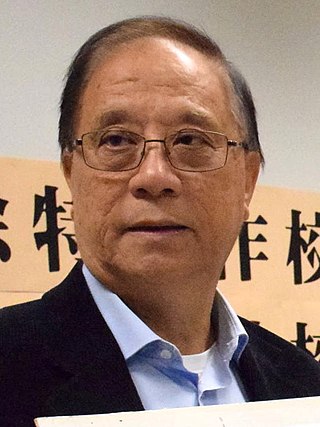
The Democratic Party leadership election was held on 1 December 2002 for the 30-member 5th Central Committee of the Democratic Party in Hong Kong, including chairman and two vice-chairman posts. Incumbent vice-chairman was elected as chairman uncontestedly, succeeding founding chairman Martin Lee Chu-ming.

The Democratic Party leadership election was held on 14 December 2008 for the 30-member 8th Central Committee of the Democratic Party in Hong Kong, including chairman and two vice-chairman posts. Incumbent Chairman Albert Ho re-elected uncontestedly, while Sin Chung-kai and Emily Lau defeated Andrew Cheng as the two Vice-Chairmen.
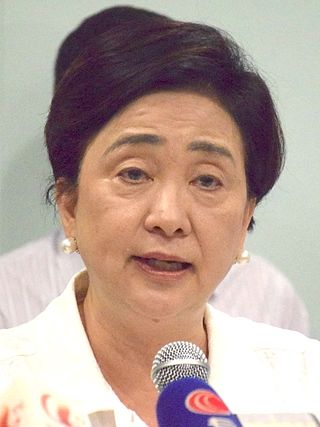
The Democratic Party leadership election was held on 14 December 2012 for the 30-member 11th Central Committee of the Democratic Party in Hong Kong, including chairperson and two vice-chairperson posts. Incumbent Chairperson Emily Lau secured her post against three other candidates after two rounds of election.
The Social Democratic Forum was a short-lived political group in Hong Kong formed by the radical faction of the Democratic Party. It consisted mostly the "Young Turks" faction of the Democratic Party which took a more pro-grassroots and street action approaches. It ceased to exist in April 2002 when most members joined The Frontier.

The Democratic Party leadership election was held on 4 December 2016 for the 30-member 12th Central Committee of the Democratic Party in Hong Kong, including chairperson and two vice-chairperson posts.

The Democratic Party leadership election was held on 2 December 2018 for the 30-member 13th Central Committee of the Democratic Party in Hong Kong, including chairperson and two vice-chairperson posts.
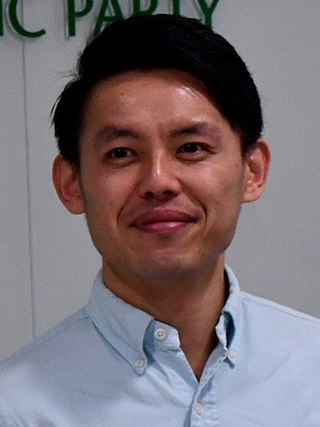
The Democratic Party leadership election was held on 6 December 2020 for the 14th Central Committee of the Democratic Party in Hong Kong, including chairperson and two vice-chairperson posts.














